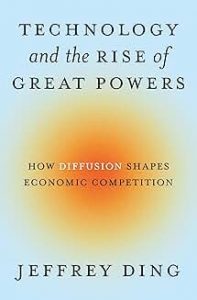I have mixed feelings about Jeffrey Ding’s Technology and the Rise of Great Powers. On the one hand, it’s an interesting and persuasive hypothesis. He argues that great power transitions such as from the UK to the US around the turn of the 20th century are driven not by the new great power commanding the technological frontier but rather by the extent to which new general purpose technologies have diffused across the whole economy. He contrasts this with the idea – apparently dominant in political science – that it is the country with control of the leading sectors that predominates.
Thus for example it was the US, not Germany, which overtook Britain because Germany commanded the chemistry frontier but the US educated chemical engineers en masse and the new chemical-enabled manufacturing techniques permeated widely. The book looks at the first Industrial Revolution – the UK’s emergence as dominant after the earlier reign of the Netherlands – as well as this 2nd industrial revolution; and also at the failure of Japan to take over from the US in the late 20th century. The book focuses on the importance of developing skills institutions that enable widespread uptake, citing for example the Mechanics’ Institutes in 19th century Britain and the spread of engineering through universities in 20th century America.
This analysis is backed up by detailed case studies – very interesting – as well as empirical work. While economists will characterise transitions involving new general purpose technologies as involving both a period of leading sector change and then diffusion across the economy, it seems very plausible to me that geopolitical transitions depend on the latter. Military and strategic strength depend on robust engineering and production capabilities; leading edge R&D is necessary but not sufficient.
The ‘other hand’ is the writing style. The text is rather repetitive and written in academic-speak. I guess the book is based on the author’s PhD dissertation, but it would have benefited from a rewrite in order not to read like a series of academic journal articles. This is a bit of a shame, as of course the argument is relevant to the relative roles of the US and China now. The book was written before the US started shooting itself in all the feet it could find in terms of sustained technical and economic progress; but in any case the author recommends the US switch its focus to developing the broad skill base needed to enable AI use across the economy if it’s serious about winning the geopolitical contest.

